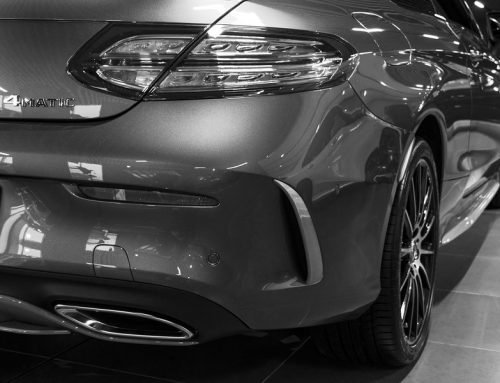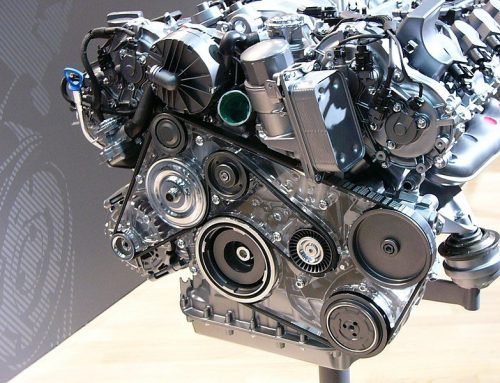In addition to luxury, Mercedes-Benz vehicles are designed for performance and maximum efficiency. Each component in your Mercedes-Benz engine are highly-engineered, and designed to provide maximum performance.
Fuel injectors in particular are a crucial part of your Mercedes’ engine, responsible for delivering fuel to the engine’s combustion chamber.
Modern diesel Mercedes-Benz engines use common-rail direct injection. Instead of using mechanically-operated pump nozzles to direct fuel, common-rail systems use high-pressure rails to direct fuel to each solenoid valve.
This has several advantages; most importantly, they allow for reduced emissions, better fuel consumption and less noise, all while delivering more power than traditional injection methods. It’s no wonder that these systems are commonly found in many diesel-powered Mercedes vehicles.
And at the heart of these common-rail systems are piezoelectric injectors.
Today, our Mercedes-Benz mechanics in Melbourne explain what these injectors are, and how they function.
A Mercedes-Benz mechanic explains the science behind piezoelectric injectors
Piezoelectric injectors are highly efficient compared to traditional solenoid injectors, and are the beating heart of modern common-rail diesel engines.
Using certain crystals (known as piezo crystals), piezoelectric injectors are able to offer superior performance to traditional diesel injection systems while minimising the emissions and noise many associate with diesel.
The unique attribute of piezo crystals such as quartz is that they change shape when exposed to an electrical current. Specifically, piezo crystals rapidly expand and contract.
This is thanks to the piezoelectric effect, first discovered in 1880. When mechanical stress is applied to certain crystals (for example, if it’s compressed or struck), an electrical charge is generated in the crystal.
More importantly, this also works the other way around: if you run an electric current through a piezo crystal, the crystal will change shape slightly.
How piezo injectors work
It’s this change in shape that makes piezoelectric crystals perfect actuators for diesel fuel injectors. Instead of using mechanical pump nozzles, piezo injectors use an actuator module made of thousands of wafers or discs, each made of piezo crystals.
These discs and wafers are all stacked on top of one another. When an electrical voltage is applied, each of them expands.
While each individual wafer only expands a tiny amount, multiple wafers all moving together has a cascading effect, creating a significant amount of rapid linear movement without any mechanical links required.
When the engine needs to inject fuel into the combustion chamber, the ECU applies an electrical current to the piezo injector. Thanks to the piezoelectric effect, the crystals expand, creating a small amount of movement.
This lengthens the overall stack, and forces the injector open, allowing diesel directly into the engine. Once the fuel is injected, the electrical current stops and the piezo stack contracts once again, closing the injector.
This reaction operates considerably faster than a traditional mechanical injection system. According to Bosch (who brought Piezo injectors to market) a Piezo actuator can act up to 5 times faster than a standard injector solenoid, and are almost frictionless.
And that directly translates to more injections per fuel cycle, ensuring a continuous supply of high-pressure fuel to the tip of the injector, as well as a higher rate of fuel delivery and improved power output.
Furthermore, piezo injectors allow a more precise amount of fuel to be added into the mix, as the ECU can control voltages with less margin for error compared to mechanical valves. This would in turn also lead to better fuel misting.
Finally, piezo injectors also theoretically offer superior longevity and durability – a side-effect of having fewer mechanical parts (and therefore, fewer points of failure).
So it should be no surprise that many Mercedes-Benz models make use of piezo injectors!
Problems with Delphi piezo injectors
Fans of the Mercedes brand may remember vehicles with early versions of the OM651 engine undergoing a major recall several years ago due to faulty injectors.
As an engine that’s found in many of the more powerful models in Mercedes-Benz’ catalogue, including C220, C250, E220 and E250 cars. In production since 2008, this engine is one of Mercedes’ first to use this more efficient type of fuel injection.
Many versions of this engine use piezo injectors from Delphi, a company that originally made its name in aftermarket parts.
However, these particular injectors from Delphi were defective, experienced a high failure rate. In many cases, the injectors would fail beyond the 50,000km mark, and the vehicle would enter limp mode, or even fail completely.
When this issue was discovered, our Mercedes-Benz mechanics in Melbourne received many calls from worried Mercedes-owners anxious about the cause of the issue, and whether or not their vehicles were among the affected.
In our experience, the root issue is a problem with the particular design from Delphi. The injectors simply weren’t as robust as they could have been.
This problem was further exacerbated due to the relative newness of the technology – as we mentioned above, this engine was one of the first commercially-available engines from Mercedes-Benz to make use of this method of fuel injection.
In many cases, the injectors would fail prematurely when faced with real-world driving conditions.
Oftentimes, when the motor powered up, there was a millisecond delay between fuel injection and motor ignition. While the delay is miniscule, given how fast piezo injectors “work”, it may result in injectors operating without fuel, causing a misfire or worse.
Thankfully, these problems were ironed out as the technology matured, and all new-build Mercedes-benz vehicles using common-rail injection appear to be free from this issue.
This is old news – why bring it up now?
Many of the more informed Mercedes-Benz lovers reading this might be wondering why we’re bringing this issue up now. While it was a fairly high-profile issue at the time, it was solved for good all the way back in 2012.
Many of the vehicles our Mercedes-Benz specialists service are older models, purchased second-hand by motorists who love the exclusivity that comes with Mercedes, but who can’t pay full-price for a brand-new vehicle.
They aren’t sure if the affected injectors have been replaced, and can’t contact the original owner.
In other cases, it could be that they’ve been taking their Mercedes to generalist mechanics, who don’t have the same level of Mercedes-specific knowledge an independent specialist like Ammstar can offer.
Their generalist mechanic may not have heard about the issue, and never replaced the injectors.
And unlike our Mercedes-Benz specialist mechanics, who have strong working relationships with original parts manufacturers, your previous generalist mechanic could have used cheap, low-quality replacement parts, which may be barely any better than the old injectors they’re replacing.
Replacing your fuel injectors – why you should leave it to a Mercedes-Benz specialist
Initially, Mercedes-Benz remedied the issue by offering revised Delphi injectors.
However, once it became clear that this wasn’t fixing the issue, Mercedes-Benz ceased using piezo injectors altogether for all vehicles powered by the OM651, replacing them with the magnetically-actuated solenoid injectors.
As we’re sure you can tell, this requires a deeper Mercedes-Benz service.
To replace the affected injectors with magnetic solenoid injectors requires:
- Sourcing a compatible replacement injector
- Installing a new ECU
- Retrofitting a fuel return line
- New engine covers
As with many deeper Mercedes-Benz services, this is a task that should only be performed by someone who knows their way around Mercedes-Benz engines, and who can guarantee that your vehicle is getting the care and attention it deserves.
Need a Mercedes-Benz mechanic in Melbourne?
Ammstar’s specialist mechanics have seen it all – that includes common issues such as the high-profile issues with Delphi piezo injectors, to relatively uncommon problems.
You know as well as anyone that Mercedes-Benz vehicles are complex and sophisticated machines, and require a considerable amount of specialist knowledge to work on.
With the local corner mechanic, you can’t guarantee that they’ll know what the issue is or be able to fix it.
And while the dealership knows their way around your Mercedes, they also charge considerably more, leaving you with a palpable sense of sticker shock.
Luckily, Ammstar allows you to enjoy the best of both worlds!
With close to 20 years looking after vehicles with the tree-pointed star, our team are experts in Mercedes specialist service. Our independent specialist mechanics can offer at prices comparable to the local mechanic, and our level of experience allows us to provide dealership-level service for all models of Mercedes.
There’s an alternative – all you need to do is call Ammstar.
- Moorabbin: (03) 9555 5580
- Fairfield: (03) 9499 9585
Alternatively, click here to book online.



